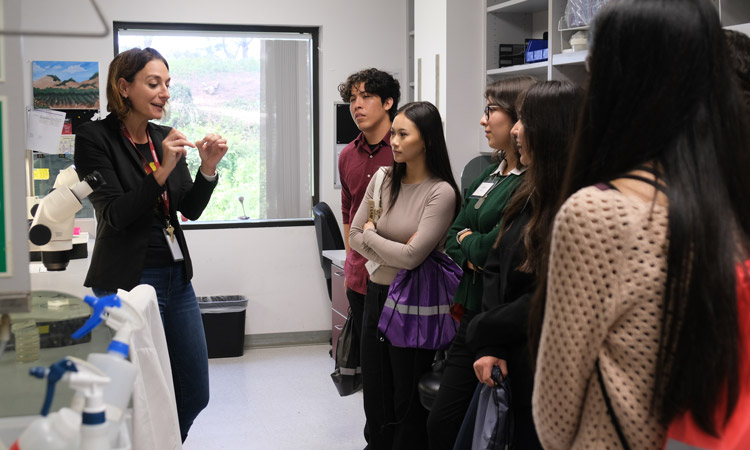Creating an inclusive environment in STEM is crucial for ensuring a broad range of perspectives and ideas, ultimately contributing to the advancement of scientific research and innovation.
This month, Sanford Burnham Prebys’ DEI Education & Training Committee hosted more than 20 high school and college students from historically underrepresented backgrounds for a day of lab tours and workshops. The event was sponsored by the San Diego MESA alliance, and faculty, staff and current trainees came together to help make the event possible.
“The sponsorship by the San Diego MESA Alliance demonstrates the collaborative efforts between organizations to support diversity and inclusion in STEM education,” said Paula Checchi, PhD, administrator in the Institute’s Office of Education, Training and International Students and leader for our DEI Committee. “Such partnerships play a vital role in breaking down barriers and providing resources to underrepresented students to overcome challenges in pursuing careers in science and technology.”
STEM Shadow Day at Sanford Burnham Prebys serves as a model for other institutions seeking to enhance diversity in STEM fields. By actively engaging with students from underrepresented backgrounds and providing them with meaningful experiences, the Institute is contributing to a more inclusive and equitable future in science and research.
After the opening comments from Checci and Alessandra Sacco, Ph.D, Dean of the Graduate School of Biomedical Sciences and Director and Professor of the Development, Aging and Regeneration Program at Sanford Burnham Prebys, high school students attended a workshop on networking skills and mentorship. Meanwhile, college students divided into groups and went on guided tours of labs across campus, where they saw firsthand how researchers are solving pressing problems in medicine.
“I’ve always known that I wanted to go into a biomedical research career,” said Owen Kelly, a high school student at High Tech High in Chula Vista. Kelly “Coming here and seeing how things really are in laboratories is very cool—it makes me even more excited to think about a future in science.”
The event ended with a networking lunch followed by a poster session, featuring work by graduate students and alumni of this summer’s SPARK internship program—a six-week, fully paid internship open to high schoolers from San Diego and Imperial Counties.
“Diversity is a huge resource, especially in scientific research,” Sacco said. “If you’re asking questions nobody has the answer to, and everybody in the room is from the same background with the same mindset, you’re less likely to less likely to find creative answers. Diversity enriches the scientific discussion, and we’re all part of the same research community.”
